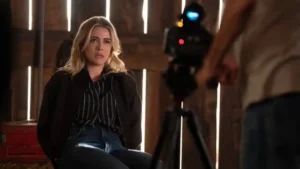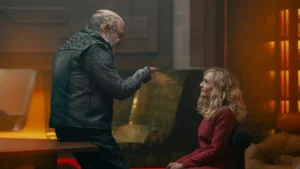Summary
Diane Morgan remains exquisite as Philomena Cunk and Cunk On Life gives her the meatiest existential subjects – and the most serious academic interviewees – to play with.
It takes an effort to remember this now, but there was a time when nobody knew who Sacha Baron Cohen (The Spy) or any of his characters were. Ali G and Borat worked on the idea of the pundit-presenter and the audience being in on the joke while the interviewee remained oblivious. Once the characters became too famous, they eventually had to be retired, because everyone knew they were being made fun of. The space left behind has barely been filled since, but Philomena Cunk occupies it perfectly, and Cunk On Life provides some of the meatiest subjects for her yet.
Diane Morgan, who plays Cunk, is undeniably brilliant. Despite the fact she has been repeating the same shtick since Charlie Brooker’s Weekly Wipe, it never, ever gets tedious, and she remains a rich vein of satire occupying that magical sweet spot that Ali G used to – being famous enough that people know to look for her, but not so famous that the various very serious experts and industry professionals she’s interviewing don’t know she’s having them on.
Morgan also seems to be the first choice for the end-of-year round-up format. Brooker deployed her in Death to 2020, where she stole all the limelight from a litany of A-list celebrities, and she has been consistently wheeled out since, to sum up topics as diverse as Shakespeare, Christmas, and the Earth. As for Cunk on Life, the clue’s in the title – she’s taking on the biggest existential questions with the help of various experts in art, philosophy, history, medicine, and theoretical physics.
I’m sure a few of the “professional mammals” are in on it – Brian Cox for certain. But most are most assuredly not, so Cunk’s inane lines of questioning provoke brilliantly aghast reactions from them. These are professional academics, professors of religious philosophy, art history, and English, from respected institutions like the University of Cambridge, King’s College London, and University College London, being asked if thoughts are made of atoms and assuredly informed that walking without bending your knees can add several years to your lifespan.
This is the Cunk way. It’s an extremely sophisticated form of childishness, really, asking clever people stupid questions about their fields. There’s a recurring gag about the Northern pronunciation of “our souls” – Morgan is from Bolton – that makes it sound like “arseholes”, and it never stops being funny. Likewise: “Do you think we came in chimps?” on the subject of evolution. You shouldn’t laugh. You know you’re better than that. But are you, really?
Cunk has masterful turns of phrase. In the opening minutes, she describes giraffes as “long-necked horse monsters”. Almost every line is like that. The commentary sections between interviews are just a parade of this stuff, about “overrated painter and decorator Michelangelo”, or Fyodor Dostoevsky’s “Crimean D’Punishment”. The interviews are bizarre made-up factoids met with hysterical bafflement or inane questions – “Is God in cupboards?” – that visibly frustrate professors.
The only weaknesses are occasional interludes for more out-there skits that clearly feel like Brooker sweeping out the furthest corners of his imagination, like an advert for a figurine version of Cunk and lots – seriously, lots – of thinly-veiled jabs at streaming (as Cunk On Life nonetheless remains available on BBC iPlayer and Netflix). Some stuff works better than the rest, unavoidably, but the rate of quality gags is absurdly high, and Morgan’s ability to keep a straight face throughout is peerless. It’s not far removed from Cunk On Earth, Cunk On Christmas, or really Cunk on just about anything, but why fix something that isn’t broken?




